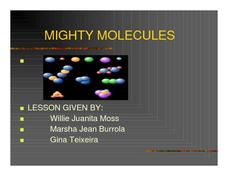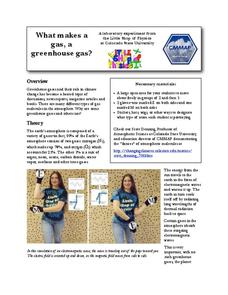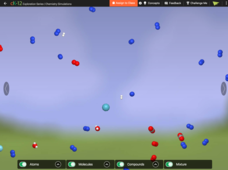Curated OER
Atoms and Elements: An Introduction
Learners are able to discuss the difference between a proton, a neutron and an electron. They also can explain the difference between an ionic and a covalent bond. Students know the main structure of atoms and molecules. Student are able...
Cornell University
The Making of Macromolecules
Compare and contrast macromolecules made from the same elements. Young scholars learn how the structure of a molecule has as much influence on a compound as the elements in the molecule. They experiment with molecular model kits to...
Curated OER
Mighty Molecules
Learners examine a PowerPoint production on molecules. Then they construct their own molecule and define what an atom, molecule, and matter is. They make a H2, HCI, and an H2O molecule. Finally, a drawing to accompany the actual model is...
Colorado State University
What Makes a Gas, a Greenhouse Gas?—The Carbon Dioxide Dance
Investigate a heated topic in environmental science. Scholars team up to play the parts of gas molecules in the atmosphere. As the teacher moves about, acting as the electromagnetic wave, learners react as their molecules would to the...
Curated OER
Activity #5 Environmental Effects
Young scholars explain the implications of particle theory of The Law of Conservation of Matter for problems of pollution and waste disposal. They describe, in terms of atoms and molecules, what happens to materials when they are...
CK-12 Foundation
Air Matters
What makes up the air we breathe? Young scientists explore the atoms and molecules in the air. An interactive lesson allows individuals to watch the movement of the particles in the air and change the makeup from a mixture to a...
American Chemical Society
Identifying an Unknown Liquid
Liquids are what's the matter with the instructional activity! Learners investigate properties of different liquids as they interact with various types of paper. They then use their observations to identify a mystery liquid to finish the...
Curated OER
What is Everything Made of?
Students observe a demonstration on how we see space between water molecules. In this experimental lesson students discover what elements make up the things around them and discuss what they learned.
American Chemical Society
Mixing Liquids to Identify an Unknown Liquid
Yellow and blue make green in a colorful lesson on liquid solutions. The seventh installment of a 16-part Inquiry to Action series asks pupils to mix different-colored solutions and record their observations. They then use their...
Curated OER
How Structure Can Affect Properties Through Phase Changes
Students discuss how changing the structure of atoms and molecules can change the properties of a substance. They brainstorm and review their own examples of phase change with the help of a phase change diagram. Students describe the...
Cornell University
Polymers: Instant Snow
Is it easy to make snow? Scholars use critical thinking skills as they investigate the concept of polymers by making snow. The class tests several different variables and takes measurements over the course of several days. They then...
Science-Class.net
Rock Candy Crystals
Candy is one of my favorite words, and it's an even better word when it relates to science. Yes, candy science can happen when you grow rock candy crystals with your class. The entire process for growing these edible wonders of nature is...
Curated OER
Matter, Matter
Students define vocabulary related to the parts of the atom. In this matter lesson, students navigate the web to find the structure and the forces that affect atoms. Students complete an experiment with positive and...
Curated OER
Reaction Reasoning
Third graders experiment with chemical reactions and examine what happens to the atoms when different reactions occur. In this matter lesson students divide into groups and complete a lab experiment.
Space Awareness
Let's Break the Particles
Build learning by breaking atoms! Young scientists study the way energy changes with a hands-on activity. As they roll steel marbles down a ramp, learners test the hypothesis that kinetic energy does not go away with friction...
Curated OER
Matter And Its Changes
Fifth graders explore the phases of matter, make observations of matter, the physical and chemical properties of matter, solutions and mixtures, formation of molecules and atoms and molecules all through hands on activities.
Curated OER
Chemical Formulas
Learners examine the structure of molecules, their formula, and percentage composition of each element in the compound. They construct an organic compound with different functional groups using a modeling kit, and draw a 3-D structure...
Curated OER
Indirect Observation
Students observe obscertainers through indirect observations and make hypotheses about the internal wall structures of the containers. In this indirect observation lesson plan, students make observations of 4 obscertainers with a steel...
Curated OER
Properties of Metals
Fifth graders study the properties of metals and use them to identify different properties. In this metal properties lesson students complete a demonstration .
Curated OER
World of Plastics and Polymers
Students investigate plastics and learn they are giant molecules made of carbon atoms. In this polymers and plastics instructional activity, students perform 3 activities which all include making polymers from household items such as...
Curated OER
Models of Hydrocarbons
High schoolers construct models of hydrocarbon molecules using candy and toothpicks. In this hydrocarbons lesson plan, students are given a sheet with the molecular formulas of hydrocarbons. As a group, they construct each molecule using...
Curated OER
Differentiate Elements, Compounds, and Mixtures
Students examine the differences between elements, compounds and mixtures. Using diagrams, they compare and contrast atoms and molecules and describe various chemical reactions. They distinguish the differences between ionic and...
American Chemical Society
Different Substances React Differently
Looks don't tell the whole story. Young experimenters explore reactions with substances that look similar. They observe the reactions that take place when combined with baking soda and use indicators to conclude they react differently...
Cornell University
Atomic Bonding
Explore the connection of surface area to bonding within atoms. Learners complete lab investigations to model changing surface area with different sizes and concentrations of atoms. A flour fireball demonstration follows the labs to...























